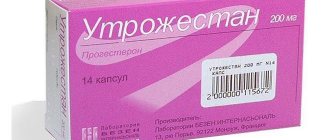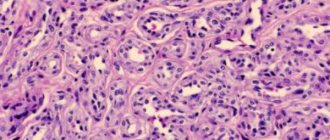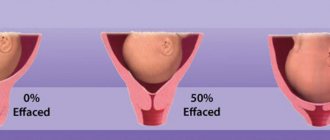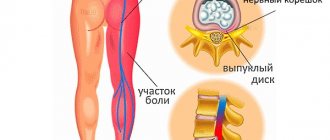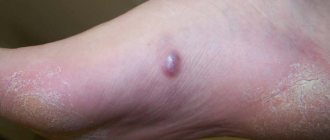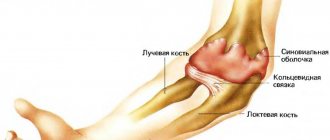Cystitis is a disease that often overshadows one of the most pleasant periods in a woman’s life—pregnancy. According to statistics, every tenth pregnant woman has encountered this disease. Medicine explains this prevalence of this pathology among expectant mothers by the structural features of the female body and the hormonal and physiological changes occurring in it during pregnancy. So what is cystitis and how can a pregnant woman cope with this disease without harm to herself and the child?
Specifics of the disease
Many women go to the doctor with complaints about the symptoms of cystitis, not yet knowing about their interesting situation.
This is due to the fact that changes in hormone levels and weakening of the immune system are favorable conditions for inflammation in the internal organs.
.
Half of the gynecologists consider this disease as the first sign of pregnancy, since most women feel discomfort in the bladder within 3-5 days after conceiving a child.
If a fetus forms in the uterus, the body begins to produce more hormones, especially progesterone and estrogen. Also, in the first few days, the level of hCG increases significantly. For the immune system, the ongoing processes are unnatural, so it begins to fight them.
At the same time, the body’s defenses are almost always reduced, which negatively affects the microflora of the genitourinary system, weakening it. Because of this, pathogenic bacteria can easily penetrate and multiply in the body.
Diagnosis of cystitis during pregnancy
If the patient has symptoms of cystitis and corresponding complaints, the doctor will recommend undergoing diagnostic examinations, and then, after studying the test results, prescribe specific treatment for cystitis during pregnancy.
If a bladder infection is suspected, a urine test . Thanks to it, you can determine whether there are any microorganisms, pus or blood in the liquid.
To diagnose bladder inflammation, your doctor may prescribe cystoscopy . This procedure is performed using a cystoscope. This device is a thin tube connected to a light source and a camera and inserted into the bladder through the urethra.
Imaging tests if there are signs of infection can be very helpful. With their help, you can quickly decide how to treat cystitis during pregnancy, because ultrasound and X-ray examinations will help exclude other possible causes of inflammation (for example, structural disorders, tumor).
Causes
How to treat cystitis in pregnant women. First you need to figure out what is the primary source of the disease and try to eliminate it. Numerous clinical studies have confirmed that pathology always occurs against a background of suppressed immunity
. Also, the likelihood of developing pathology increases due to changes in hormonal levels, which negatively affects the vaginal microflora.
Important!
Suppression of the immune system during pregnancy is a natural reaction of the body aimed at preventing fetal rejection.
Most often, the following factors contribute to the appearance of the disease:
- weakening of the body's defenses;
- dysbiosis of the intestines and genitourinary system;
- constant stress and emotional stress;
- prolonged exposure to frost;
- failure to comply with hygiene rules.
Prevention of cystitis in pregnant women
In order to avoid cystitis against the background of reduced immunity, pregnant women are advised to take measures to support the body. It is worth increasing the number of hours of walking in clean air and doing yoga for pregnant women.
It is important not to endure the urge to urinate for too long, as this can lead to cystitis. A pregnant woman should go to the toilet every 2–3 hours . It is also recommended to empty your bladder before and after sexual intercourse.
In addition, it is worth remembering about proper nutrition. Pregnant women are not recommended to abuse salty, sweet, sour or smoked foods. Alcohol and carbonated drinks are strictly prohibited. Don't overwork and overcool. It is worth remembering about personal hygiene.
Symptoms
Since the signs of cystitis during pregnancy are quite pronounced and cause a lot of inconvenience to the woman, it is impossible to miss its development.
Most women complain about the following violations :
- too frequent urge to go to the toilet, accompanied by insignificant urine output;
- burning and itching when urinating;
- the appearance of blood in urine;
- change in urine color (urine becomes cloudier);
- the appearance of an unpleasant odor;
- feeling of heaviness and pressure in the lower abdomen;
- insignificant increase in body temperature (maximum up to 37.5 degrees);
- discomfort in the pelvic area.
If the symptoms of cystitis
during pregnancy last more than 48 hours, you need to urgently visit the clinic.
Prevention
In order to avoid this unpleasant disease during pregnancy, you need to follow a few simple rules:
- monitor your well-being and immediately consult a doctor at the first deviations,
- empty your bladder regularly,
- avoid hypothermia,
- drink enough fluids (if there are no contraindications from a doctor),
- engage in physical exercise (if there are no contraindications from a doctor).
And most importantly, do not be discouraged: a positive attitude can become a very effective weapon in the fight against any illness.
Especially for beremennost.net – Ksenia Dakhno
Why is the disease dangerous?
This question interests almost all expectant mothers.
Doctors assure that for a healthy person, the inflammatory process in the genitourinary system in the early stages is not dangerous and can easily be eliminated with properly selected therapy. But the situation is completely different when carrying a child. Why is cystitis dangerous during pregnancy?
If a woman, while expecting a baby, constantly experiences discomfort and pain in the bladder area, this leads to nervousness and anxiety, which negatively affects the condition of the fetus.
Important! What is an ultrasound scan called during pregnancy: at what time is it done?
When cystitis occurs during pregnancy in the early stages, treatment is necessary urgently, otherwise the disease may begin to progress, which will cause the development of various complications
. Most often, inflammation negatively affects the kidneys and leads to infection. In addition, pathogenic bacteria can have a detrimental effect on the baby, causing weight loss or premature birth.
Cystitis in the first trimester of pregnancy
Most often, cystitis develops in the first trimester of pregnancy, when hormonal levels change, the tone of the muscles of internal organs decreases and the immune system is weakened. A woman during this period is prone to infections.
Urologist: if you want to get rid of cystitis so that it doesn’t come back, you just need to dissolve Read more »
The causative agent of cystitis in early pregnancy is Escherichia coli. It can penetrate the urethra from the perianal area. Also, cystitis at the beginning of pregnancy is caused by staphylococci, streptococci and other opportunistic microorganisms.
Provoking factors
- exacerbation of chronic infectious diseases: colpitis, vulvitis, gardnerellosis, pyelonephritis, tonsillitis;
- hypothermia of the body;
- urogenital, sexually transmitted infections;
- development of respiratory viral diseases, including influenza;
- abuse of spicy foods;
- chronic constipation;
- failure to comply with personal hygiene rules;
- disturbance of vaginal microbiocenosis, intestinal dysbiosis;
- wearing too tight underwear made of synthetic fabrics, squeezing the pelvic area with tight jeans and trousers.
The more of these factors affect the pregnant woman’s body, the higher the risk of developing cystitis.
Cystitis as a sign of pregnancy before delay
In some sources, cystitis is called the first sign of pregnancy - the disease is so common in pregnant women. But experts are skeptical about this.
Unfortunately, a woman has no other ways to establish pregnancy before a delay. If the inflammatory process in the bladder worsens only during pregnancy, you should be wary and consult a doctor. The specialist will conduct an examination and prescribe treatment that will prevent the spread of infection and help avoid the threat of miscarriage.
If we consider cystitis as a sign of pregnancy, it is only presumptive. In any case, only a gynecologist can determine the exact period (based on examination and ultrasound). Modern tests can detect pregnancy on the first day of delay, and they should be trusted more than presumptive signs.
Treatment
How is cystitis treated in early pregnancy? It is known from practice that the symptoms of the disease quite often go away on their own within 2-3 days
. But if the body is too weakened, you should not count on such a favorable outcome; you will have to fight the infection with the help of drug therapy. What you can do for cystitis during pregnancy, and how long treatment lasts.
Despite the fact that today there are various medicines for cystitis during pregnancy on sale, Urolesan remains one of the most popular and widespread remedies. Since this combination drug contains only natural ingredients, it is very well accepted by the body and does not cause side effects.
.
The main active ingredients are:
- fir oil;
- castor extract;
- hop cone extract;
- carrot extract.
It is important to know!
In the early stages of pregnancy, Urolesan can provoke an allergic reaction, diarrhea and nausea.
Each of these components is safe to take while pregnant, but consulting a doctor before treatment is necessary in any case. The medication is available in the form of a solution for oral use. Experts recommend using Urolesan during pregnancy as follows: drop a few drops of the medicine onto a piece of sugar and gradually dissolve it. For cystitis, the dosage and course of treatment are selected individually, depending on the characteristics of the body and the nature of the disease.
Candles
For cystitis, pregnant women can use suppositories.
This therapy has many advantages, one of which is its speed. If cystitis is diagnosed during early pregnancy, treatment with suppositories is preferable, since such medications do not have a negative effect on the liver or kidneys
.
In addition, suppositories contain a smaller amount of active ingredients, due to which they practically do not interfere with the functioning of the digestive tract.
The following drugs have proven themselves best:
- Hexicon. It is an antiseptic, suitable for use in the first trimester;
- Polygynax. Fights inflammation in the bladder;
- Betadine. The product has a wide range of effects and also has a pronounced antibacterial effect.
Like any other medicines
, candles can cause negative consequences. Most often, such therapy leads to irritation of the mucous membranes.
Pills
If cystitis is detected during early pregnancy, treatment can be carried out using tablet medications. Their main advantage is that it is almost impossible to make a mistake with the dosage.
Most often, women are prescribed:
- Canephron. The main active ingredients are lovage root and centaury. Despite the fact that the drug contains no chemical compounds, it can only be used after a doctor’s prescription;
- Cyston. The product is made on the basis of bicarp, basil and mimosa. The drug helps eliminate the inflammatory process and normalize the outflow of urine;
- Furagin. The drug has a pronounced antimicrobial effect. It is used not only to combat inflammation of the bladder, but also to eliminate pyelonephritis and urethritis.
In most cases, it is possible to cope with the signs of pathology within 4-5 days; longer therapy is usually prescribed during exacerbation of the disease
.
Diet
Proper nutrition helps combat and prevent bladder inflammation.
A woman needs to consume about 2 liters. liquid per day, this will flush the bladder and prevent irritation of the walls.
You can also replace water with fresh compotes and fruit drinks.
Cranberry juice has proven itself very well - it is a natural medicine against cystitis.
Interesting! What pregnant women should not eat: list of prohibited foods
To prevent the development of the disease, it is necessary to minimize the consumption of the following foods:
- spices, seasonings, herbs, among which the most dangerous are: pepper, mayonnaise, sauces, mustard and horseradish;
- fresh vegetables such as onions and garlic;
- smoked meats and pickles;
- fatty meat broths;
- Coffee and tea;
- lemonades.
Citrus fruits are very useful for inflammation of the bladder. If such a diet cannot overcome symptoms, a woman can adhere to a vegetarian diet
.
Treatment of cystitis during pregnancy
Treatment for bladder inflammation depends on the causes that caused it. If cystitis is caused by an infection, then antibiotics . Some of them have a negative effect on the fetus. Such drugs are prohibited for pregnant women. However, there are also safe medications for cystitis during pregnancy. These are the medications that doctors prescribe to their patients.
Treatment of non-infectious cystitis depends on its forms. Can be used:
- painkillers;
- anticholinergic drugs;
- medications for cystitis during pregnancy, relaxing the bladder muscles, reducing the strong urge to urinate.
Regardless of the type of inflammation, it is recommended to stay in bed and drink enough water.
Causes
Cystitis is predominantly a female disease due to the characteristics of female anatomy, namely the short and wide urethra and its proximity to the vagina. This anatomical structure increases the likelihood that an infection will enter the bladder.
During pregnancy, this attack occurs especially often due to suppressed immunity.
Natural suppression of the immune system is necessary to prevent embryo rejection, but it also contributes to the development of various infections, including those leading to cystitis.
In addition, during pregnancy, the vaginal microflora may change under the influence of hormonal changes. Pathogenic microorganisms from the vagina, entering the bladder, lead to inflammation.
The main factors that increase the risk of cystitis:
- weakened immunity;
- dysbiosis of the vagina and intestines;
- past inflammatory diseases;
- overwork;
- hypothermia;
- failure to comply with hygiene standards.
In order to prevent the occurrence of cystitis, you should wash the external genitalia at least once a day. But not more often!
During pregnancy, vaginal secretions increase, and women often begin to shower several times a day. Such zeal can lead to dysbacteriosis, and as a result, cystitis.
There are also non-infectious forms of the disease. They occur much less frequently than infectious ones. Their main reasons are as follows:
- taking certain medications that are excreted in the urine;
- allergies to cosmetics, condoms, vaginal tampons.
